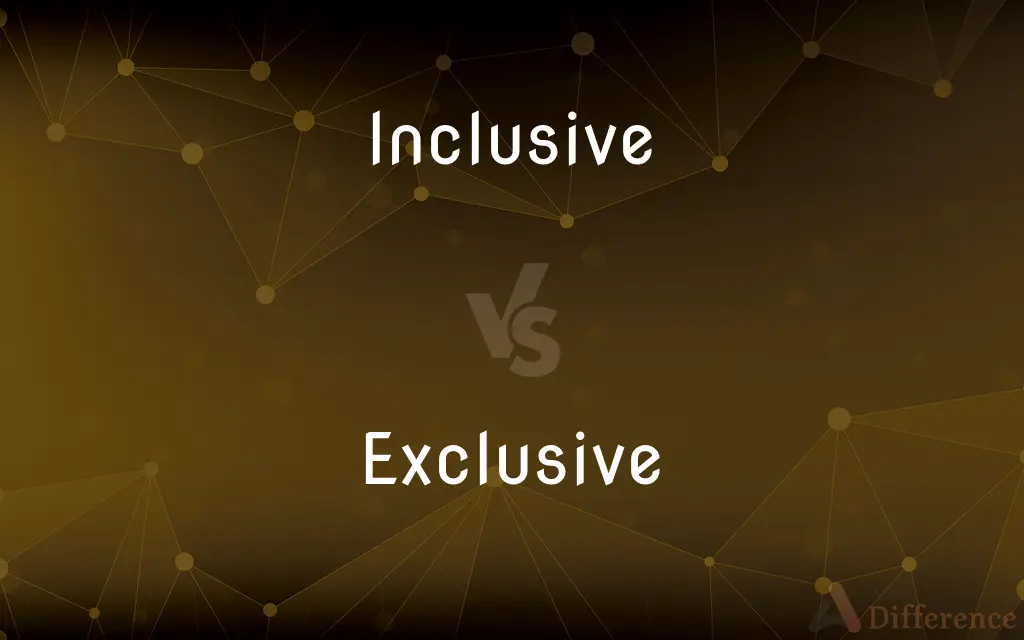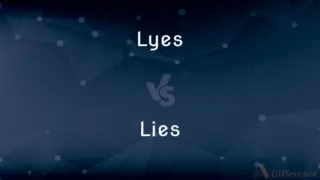Inclusive vs. Exclusive — What's the Difference?
Edited by Tayyaba Rehman — By Fiza Rafique — Updated on October 30, 2023
Inclusive is the covering or including everything, open to all. Exclusive is limited to only certain people or groups, excluding others.

Difference Between Inclusive and Exclusive
Table of Contents
ADVERTISEMENT
Key Differences
The term inclusive refers to the idea of encompassing everything or everyone, ensuring no one is left out. In contrast, exclusive means restricting or limiting access, ensuring that it's only available to a specific group or select few.
When thinking about inclusivity, it's synonymous with universality, where all are welcome without discrimination. On the other hand, exclusive denotes a certain level of elitism or privilege, making certain things or areas available only to those deemed fit or worthy.
In practical applications, if a deal is said to be inclusive, it typically means everything related to that deal is covered in a single package or price. On the flip side, an exclusive offer would mean it's available to a limited audience or for a limited time, perhaps because of its premium nature.
Within societal contexts, inclusive practices aim at ensuring equal opportunity for all, regardless of background, gender, race, or ability. Meanwhile, exclusive can often be seen in contexts like private clubs or luxury services, where entry is restricted.
To put it simply, while inclusive embraces the idea of 'all,' exclusive revolves around the concept of 'select' or 'few'.
ADVERTISEMENT
Comparison Chart
Meaning
Covering everything, open to all.
Restricted to certain people or groups.
Nature
Universal.
Selective.
Availability
Generally available to everyone.
Limited availability.
Contextual Application
Promotes equality and accessibility.
Denotes privilege or elite status.
Perception
Often seen as welcoming and non-discriminatory.
Can be seen as elitist or selective.
Compare with Definitions
Inclusive
Not excluding any particular group.
The program is inclusive of people from all backgrounds.
Exclusive
Restricted to a particular group.
It's an exclusive club for members only.
Inclusive
Embracing diversity and equality.
An inclusive workplace values all its employees.
Exclusive
Unique and limited in availability.
The artist released an exclusive edition of the painting.
Inclusive
Encompassing in nature.
The curriculum is inclusive of all the necessary topics.
Exclusive
Not divided or shared.
She had exclusive rights to the song.
Inclusive
Covering all or everything.
The tour package is inclusive of meals and accommodation.
Exclusive
Excluding certain groups or individuals.
The event is exclusive to VIP ticket holders.
Inclusive
Taking a great deal or everything within its scope; comprehensive
An inclusive survey of world economic affairs.
Exclusive
Excluding or tending to exclude
Exclusive barriers.
Inclusive
Including the specified extremes or limits as well as the area between them
The numbers one to ten, inclusive.
Exclusive
Not allowing something else; incompatible
Mutually exclusive conditions.
Inclusive
(Linguistics) Of, relating to, or being a first person plural pronoun that includes the addressee, such as we in the sentence If you're hungry, we could order some pizza.
Exclusive
Not divided or shared with others
Exclusive publishing rights.
Inclusive
Including (almost) everything within its scope.
An inclusive list of data formats
Exclusive
Not accompanied by others; single or sole
Your exclusive function.
Inclusive
Including the extremes as well as the area between.
Numbers 1 to 10 inclusive
Exclusive
Complete; undivided
Gained their exclusive attention.
Inclusive
(linguistics) Of, or relating to the first-person plural pronoun when including the person being addressed.
The pronoun in "If you want, we could go back to my place for coffee" is an inclusive "we".
Exclusive
Not including the specified extremes or limits, but only the area between them
10-14, exclusive.
That is, 11, 12, and 13.
Inclusive
Including or accepting those belonging to a particular group.
Trans-inclusive feminism
Exclusive
Excluding some or most, as from membership or participation
An exclusive club.
Inclusive
Inclosing; encircling; surrounding.
The inclusive vergeOf golden metal that must round my brow.
Exclusive
Catering to a wealthy clientele; expensive
Exclusive shops.
Inclusive
Comprehending the stated limit or extremes; as, from Monday to Saturday inclusive, that is, taking in both Monday and Saturday; - opposed to exclusive.
Exclusive
(Linguistics) Relating to or being a first person plural pronoun that excludes the addressee, such as we in the sentence Pat and I are in town, so we can meet you for lunch.
Inclusive
Including much or everything; and especially including stated limits;
An inclusive art form
An inclusive fee
His concept of history is modern and inclusive
From Monday to Friday inclusive
Exclusive
A news item initially released to only one publication or broadcaster.
Inclusive
Comprehending the stated limits.
The age range is 5-10, inclusive.
Exclusive
An exclusive right or privilege, as to market a product.
Exclusive
(literally) Excluding items or members that do not meet certain conditions.
Exclusive
(figuratively) Referring to a membership organisation, service or product: of high quality and/or renown, for superior members only. A snobbish usage, suggesting that members who do not meet requirements, which may be financial, of celebrity, religion, skin colour etc., are excluded.
Exclusive clubs tend to serve exclusive brands of food and drinks, in the same exorbitant price range, such as the 'finest' French châteaux.
Exclusive
Exclusionary.
Exclusive
Whole, undivided, entire.
The teacher's pet commands the teacher's exclusive attention.
Exclusive
(linguistics) Of or relating to the first-person plural pronoun when excluding the person being addressed.
The pronoun in "We're going to a party later, but you aren't invited" is an exclusive "we".
Exclusive
(of two people in a romantic or sexual relationship) Having a romantic or sexual relationship with one another, to the exclusion of others.
They decided to no longer be exclusive.
Exclusive
Information (or an artefact) that is granted or obtained exclusively.
The editor agreed to keep a lid on a potentially disastrous political scoop in exchange for an exclusive of a happier nature.
Exclusive
A member of a group who exclude others from their society.
Exclusive
(grammar) A word or phrase that restricts something, such as only, solely, or simply.
Exclusive
Having the power of preventing entrance; debarring from participation or enjoyment; possessed and enjoyed to the exclusion of others; as, exclusive bars; exclusive privilege; exclusive circles of society.
Exclusive
Not taking into the account; excluding from consideration; - opposed to inclusive; as, five thousand troops, exclusive of artillery.
Exclusive
One of a coterie who exclude others; one who from real of affected fastidiousness limits his acquaintance to a select few.
Exclusive
A news report that is reported first by one news organization;
He got a scoop on the bribery of city officials
Exclusive
Not divided or shared with others;
They have exclusive use of the machine
Sole rights of publication
Exclusive
Excluding much or all; especially all but a particular group or minority;
Exclusive clubs
An exclusive restaurants and shops
Exclusive
Not divided among or brought to bear on more than one object or objective;
Judging a contest with a single eye
A single devotion to duty
Undivided affection
Gained their exclusive attention
Exclusive
Of high quality or prestigious.
They live in a more exclusive part of the city.
Common Curiosities
Does "Inclusive" mean everyone is included?
Yes, "inclusive" typically means covering or including everyone.
Does "Inclusive" education mean all students are in one classroom?
Not necessarily. It means all students have equal access to education, but adaptations can be made based on needs.
Is "Exclusive" synonymous with "expensive"?
Not always. While exclusive items can be costly, "exclusive" refers more to availability than price.
Is "Exclusive" always a negative term?
No, "exclusive" can be neutral or positive, denoting rarity or prestige. It's context-dependent.
Are inclusive practices always better?
It depends on the context. Inclusion promotes equality, but there are situations where exclusivity is appropriate or necessary.
Can a product be both inclusive and exclusive?
It's paradoxical, but a product can be inclusively designed (for all users) yet exclusively sold (to a select few).
Does "Inclusive" mean the same as "comprehensive"?
They're similar, but "inclusive" emphasizes the inclusion of all, while "comprehensive" emphasizes thoroughness.
Can an event be "exclusive" because of its limited capacity?
Yes, an event can be exclusive due to capacity constraints, ensuring only a certain number can attend.
Can "Exclusive" be used in a legal context?
Yes, such as when someone has "exclusive rights" to something, meaning only they hold those rights.
Why aim for "Inclusive" practices?
Inclusivity fosters a sense of belonging, promotes equality, and values the contributions of all.
Does "Inclusive" mean free from discrimination?
Generally, yes. Inclusive practices aim to eliminate discrimination and ensure equal opportunity.
Are all "Exclusive" clubs elitist?
Not necessarily. They might be exclusive due to a shared interest rather than status.
Can an "Exclusive" offer be available to everyone later?
Yes, what starts as an exclusive offer can later be made available to a broader audience.
How does "Inclusive" relate to diversity?
Inclusivity often goes hand-in-hand with diversity, ensuring that varied perspectives and backgrounds are embraced.
Are "Exclusive" products always of higher quality?
Not always. While some exclusive products boast higher quality, others might be exclusive due to branding or marketing strategies.
Share Your Discovery

Previous Comparison
Lyes vs. Lies
Next Comparison
Manuel vs. ManualAuthor Spotlight
Written by
Fiza RafiqueFiza Rafique is a skilled content writer at AskDifference.com, where she meticulously refines and enhances written pieces. Drawing from her vast editorial expertise, Fiza ensures clarity, accuracy, and precision in every article. Passionate about language, she continually seeks to elevate the quality of content for readers worldwide.
Edited by
Tayyaba RehmanTayyaba Rehman is a distinguished writer, currently serving as a primary contributor to askdifference.com. As a researcher in semantics and etymology, Tayyaba's passion for the complexity of languages and their distinctions has found a perfect home on the platform. Tayyaba delves into the intricacies of language, distinguishing between commonly confused words and phrases, thereby providing clarity for readers worldwide.
















































